
views
Making Dietary Changes

Keep a food and drink diary. Get a small journal, or maintain a log on your computer, in which you list everything that you drink and eat throughout the day. Try to write down both the portions and a description of the item itself. Then, on a daily basis, go through and track how many calories that you are consuming. If you are unsure about the nutritional profile of a particular food, you can go online and look for a free calorie or nutrition calculator. There are a number of food diary apps available for download as well, such as Rise Up and Calorific. Keeping a log can encourage you to eat healthy foods as well. It can also help you to identify if you have a tendency to eat poorly at certain periods of the day.
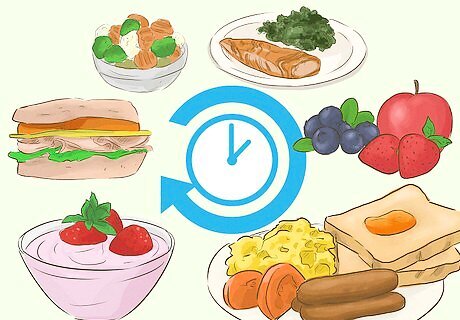
Eat more. Gaining weight requires that you consume additional calories. To gain steadily over a month, you should aim for a 5 to 10% increase from a standard calorie intake, determined by your age and weight. To stay healthy, you’ll want to eat additional portions of good foods, instead of going for high-fat junk foods. A few examples of healthy, filling foods are: bananas, almond butter, sweet potatoes, and lean meats. If, for example, you are trying to bulk up and normally eat one banana a day, you may want to boost it up to three per day.
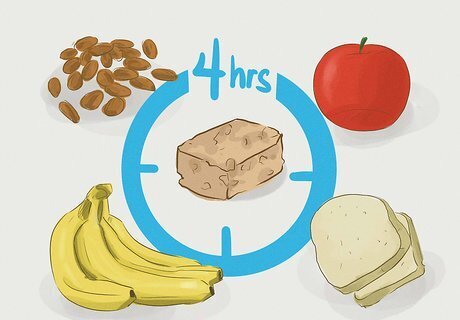
Eat every few hours. A good rule to follow is to make sure that you eat a full meal or snack at least every four hours. This will keep your energy level balanced and will allow you to consume more calories over the day. If you skip meals, you are forcing your body to break down tissues in order to continue functioning, which does not promote healthy weight gain. If you are trying to gain weight, it may be a good idea to eat a filling meal right before bed. This will give your body the nutrients that it needs to repair itself overnight. A whole-grain pasta dish is always a good option.
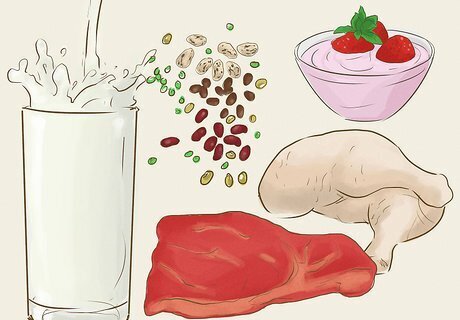
Consume plenty of protein. To gain weight in a healthy way, you’ll need enough protein to fuel your muscles, along with some excess. A good rule of thumb is to consume 0.8 grams of protein per pound (1.6 grams per kg) of body weight each day. However, be aware that eating a significant amount of protein can also make you feel fuller longer, so it is important to keep eating throughout the day. Examples of high-protein foods include nut butters, lean meats, certain dairy products, and eggs.
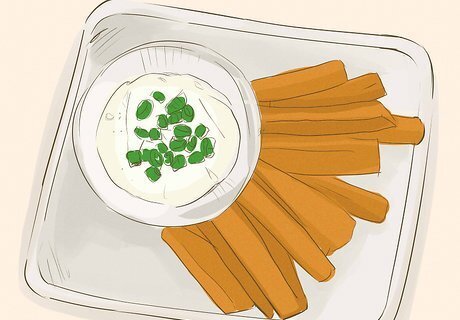
Choose smart snacks. Carry snacks with you throughout the day, such as bags of carrots with hummus. As often as possible, eat snacks that include three or more food types. For example, a piece of toast with peanut butter on it, topped with banana slices. This will guarantee that you stay full and get enough nutrients.

Consume liquid calories. Liquids are a good option as a snack or meal supplement, not a replacement, when you are trying to gain weight. Supplement drinks or smoothies are a great way to mix in plenty of calories. Try out various combinations in your blender until you find one that is both filling and appetizing. You can also drink 100% fruit juice or dairy products. For example, a filling smoothie recipe might include almond milk, protein powder, shaved dark chocolate, nut butter, and coconut milk. If you are adding supplement drinks to your routine, drink one or two a day in addition to meals to encourage weight gain. Make sure to also drink plenty of water. Aim for at least eight glasses per day.
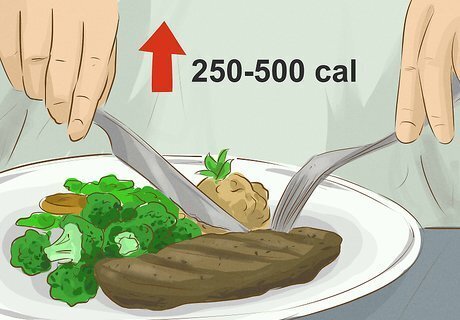
Change your diet if you plateau. It is quite possible that you will stop gaining weight at some point in the month. If this happens, you’ll want to take another look at your diet and make adjustments to your protein and calorie intake. Make sure to continue to make healthy food choices, perhaps including additional high-calorie days.
Making Lifestyle Changes
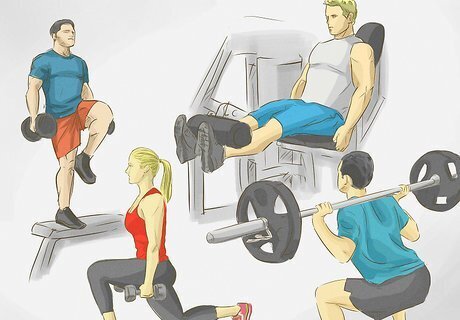
Train hard. A training program can help turn those extra calories into muscle, instead of just fat. You'll want to combine both weight and cardio training. Be prepared to work out at least five days a week to see maximum benefits.

Limit your cardio. You’ll need to cut down your long distance cardio program if you are trying to gain weight. Long runs, for example, can burn up many of your stored calories. Instead, go for short, 15-minute cardio interval programs or incorporate sprints into a weight routine.

Follow a weight lifting plan. Talk with a personal trainer and develop a specific weight workout plan that suits your goals. You’ll likely need to alternate very heavy lift days with lighter ones. Expect to spend at least 45 minutes at each session. It is quite possible that your trainer will also instruct you to train in intervals, performing a number of exercises in sets. You can get your diet and exercise program to work together by making good use of your “workout window.” Make sure to eat protein and carbs immediately before and after working out.

Let your body rest and recover. You may be tempted to continually push yourself without a break for the full month. This can backfire and result in illness or injury. Instead, make sure to incorporate exercise rest days, diet cheat days, and just general relaxation periods. Getting at least eight hours of sleep a night is also important.
Being Realistic and Staying Motivated

Start off slowly. Especially if you are new to exercising and food management, expect to ease slowly into these lifestyle changes. You might experiment with what foods seem to get a good response from your body and which exercises have the most impact. It is also a good idea to be conservative when estimating calorie intake, as you can always boost it up later.

Know why you want to make a change. To keep going when you hit plateaus or difficult points, it is important to know what is motivating you. Think about why you need to gain the weight and whether it is critical that you succeed. Remind yourself that your change must be healthy and involve you gaining muscle, not just fat. If you get discouraged, remind yourself of your goals by stating, “I need to do this. I can do this.” Repeat until you feel ready to go again.

Watch out for negative triggers. Try to think about your daily habits to predict any personal challenges before they might occur. If you are fond of eating a very light breakfast, then that is one area that you might need to target for extra calories. If you have certain friends who do not support your plan, then you may need to get some distance from them. Think about ways that you can also incorporate new habits into your lifestyle that fit your weight gain goals. For example, find a workout buddy who has similar objectives.

Build in periodic rewards. Give yourself a tasty treat before or after a workout. Take a day off every once in a while and do not exercise or follow your diet plan. Use your exercise sessions as a time to listen to some great music. Intermix what you enjoy with your goals, when possible. Don’t let your cheat days get out of control. This can lead to too much fat gain.

Get your family and friends involved. Tell people who you trust about your weight gain plans. Ask for their advice and support in the upcoming days. They might be able to suggest recipes or even act as a workout partner.

Work with a strength and nutrition coach. You can find a local coach through your gym or doctor. A personal trainer can adjust your workout program to fit your goals. A dietitian will make sure that you are eating enough fuel to stay healthy and on track.













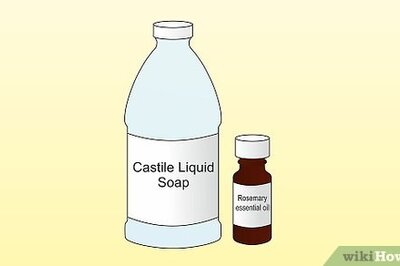




Comments
0 comment